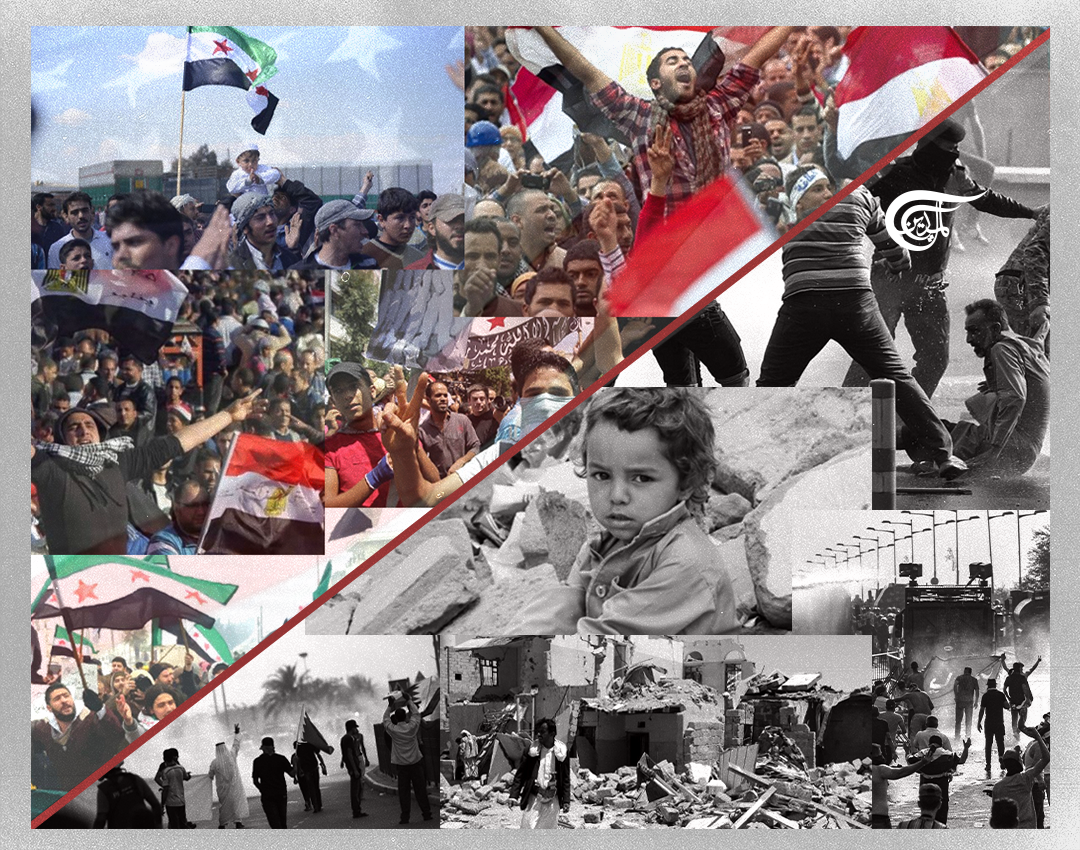Ten Years After 'Arab Spring'
Ten years after the onset of the Arab Spring, the Arab countries are inarguably worse conditions than they had been in 10 years ago.
The last decade in the Arab World has been characterized by anti-government protests described during the early days of the Arab Spring that was viewed as an ‘awakening’ of the Arab consciousness.
Austerity policies and discontent with US-backed dictatorships of Mubarak and Ben Ali set off the original wave of protests at the turn of 2011 in Egypt and Tunisia respectively, spreading like wildfire into Bahrain as well as Syria and Libya.
It is also not to say Ben Ali or Mubarak’s unseating wasn’t a positive development in line with the aims of social and political change for many Egyptians and young Arabs. For the first time, social organizations were formed, grassroots mobilization was ushered into the mainstream, and many political prisoners were released. Yet even aside from temporary Muslim Brotherhood victories in Egypt and, to an extent, Yemen, the transpiring of local events after 2011 provided an opportunity for the US and "Israel" to further act on its ambitions in West Asia and North Africa.
Algorithmic Soft War
The Egyptian movement was hailed for its participant’s use of Facebook and Twitter to organize, yet given the US’s pioneering of social media regime change, it is apparent that it was more than just the Arab youth that had a hand in the events that unfolded at the turn of 2011.
The Arab Spring was a further experiment in manipulating movement through algorithms and data, enabling Western powers to continue to channel and shape the discourse, energy, and frustration of Arab youth. In the 70s and 80s, Washington's consensus strategy of supporting right-wing strongmen had become obsolete; but dissolve the state completely, capitalizing off the disintegration of the state and facilitating new means of “color revolution” as a secondary aim. USAID had taken note in a policy document on the results and energy of the Iranian so-called “Green Revolution” of 2009. The Iranian experiment, having been dubbed the original Twitter revolution, provided the adequate grounds to replicate the mass manipulation of algorithms that would provide the framework for the USAID’s creation of a Cuban “Twitter,” or “ZunZuneo” in 2010, the following year. The Twitter look-alike encouraged Cubans to organize anti-government mobs, with the aim of overthrowing the Cuban government.
As the capitalist American publication, the Economist, said in a 2017 article, “data is the new oil.” Even as far back as 2009, data, like oil had in the past, represented a new resource instigating Western regime change in the Arab world. In fact, these so-called “Twitter revolutions” were dubbed after the very platform that capitalized off mass reaction to subvert and manipulate, rather than support, the conditions for revolution.
Twitter was (or is?) a useful political data-mining experiment, rather than a neutral platform that had found itself used nefariously by coincidence. The unpopularity of the Sisi and Ben Ali regimes, comprador leaders that have lost their usefulness to the West amongst Arab youth, has been a perfect testing ground to experiment with the overthrow of governments antagonistic to the US, such as in Libya and eventually Syria and Iran.
The US reaction
"Israel" threw its support behind the 2013 military coup against Morsi , leading to the respawn of a new Saudi and Israeli-friendly regime under Abdul Fattah al-Sisi. Then, Secretary of State Hilary Clinton, an Obama lackey, carried out orders to overthrow the Libyan government, with the help of extremist rebels, working to replicate the same outcome in Syria at the same time. Meanwhile, the despotic-US-backed regimes of Saudi Arabia, Bahrain, and pre-2014 Yemen did not experience the same momentum in regime change and governmental overthrow despite rallies and movements for change amongst their constituencies.
These outcomes proved an old rule in political science attributed to Lenin - that “without revolutionary theory, there can be no revolutionary movement.” The movements that the US regime ultimately took advantage of in the Arab spring and its aftermath had tapped into secularist and Islamist currents alike. In Egypt, secularist youth illuminated military helicopters with green laser lights to celebrate the military coup overthrow of Morsi. Countries with more established movements rooted in anti-imperialism and national sovereignty as a precondition for political justice were seldom heard or galvanized in the Western press the way more disorganized mass movements were (not clear). Bahrain’s main trade union and top opposition political party, Al-Wefaq, then holding the largest seats in Bahraini parliament for the previous five years, for example, organized general strikes and backed the anti-Khalifah clan protests that produced ruthless crackdowns on both protestors, civil society organizations, and popularly representative political parties to this day.
Was Bahrain’s organized and popular struggle for representation and democracy met with the same crocodile tears of sympathy by the United States and the West? Not only was it regarded with complete silence from Western media, but the US Joint Chief of Staff Admiral Mike Mullen extended support to Bahrain’s king and Saudi King Salman at a meeting, showing the US’s commitment to its military bases over democracy.
The US, after 2011, chose rather to express its support towards ‘revolution’ in Syria, which was neither a popular uprising nor backed by any credible organization. The western framing of the Syrian unrest as a popular or working-class mobilization, and not a militaristic campaign to neoliberalize and break the links between the Lebanese and Palestinian Resistance and Syria. On the contrary, the Syrian General Federation of Trade Unions threw their weight behind the government, with the West broadcasting the facade of ‘organized opposition’ with the EU and NATO-backed and Istanbul, Turkey headquartered Syrian National Council and Free Syria Army, both propped up in 2011 with support from these foreign powers.
The discourse of individual liberties over national liberation was a broad brush by which the West had framed the motivations for the unrest in 2011 and the framework by which the Color Revolutions in Lebanon and Iraq in late 2019 were furthered. Like 2011, the social and economic unrest that had justifiably catalyzed mass mobilization took a downturn when the West quickly capitalized off the lack of organization to stir up against sovereign elements in both respective governments (Hezbollah and the PMU respectively). The use of Twitter for politicized data mining and hashtag propagation resurfaced again. Data scientist Mark Owen Jones found that 35% of 2,297 fake Twitter accounts tweeting about the Lebanese uprising came from Saudi Arabia. A significant spike in their creation occurred in September 2019, over a month before the onset of protests.
Going backward?
Ten years after the onset of the Arab Spring, the Arab countries are inarguably worse conditions than they had been in 10 years ago. Poverty in Egypt has increased from over a quarter of the population in 2015 to over a third in 2018, despite ‘economic reforms’ raking in increasingly unequal profits.
Libya has since been transformed by NATO from the African nation with the highest standard of living on the continent into an open-air slave market. Even Tunisia, hailed by East and West alike as the only salvageable outcome of the Arab Spring, has suffered from increasing unemployment and poverty in city peripheries and rural areas alike. Geopolitical hostilities and conflict, spurred on mainly by Saudi Arabia’s war on Yemen, the US’s deepened involvement in Syria and Iraq, renewed settlement expansions and assault on the Palestinians by the Zionist entity, and the regional effects of the Gulf and West’s economic as well as military assault on having been proliferated across the region.
As the unfolding of current events shows, the inextricable link between the struggle for political sovereignty against the US and its allies and worsening economic conditions of peripheral Arab economies has only become more significant. The last decade began with unrest in Tunisia and ended in Lebanon (with protests resurfacing in Tunisia as of late), marking the hindsight from which we evaluate the failures of the Arab Spring, and for the foresight from which we analyze the ongoing manipulation of the economic and political consequences of imperialism today.

 Julia Kassem
Julia Kassem
 8 Min Read
8 Min Read












